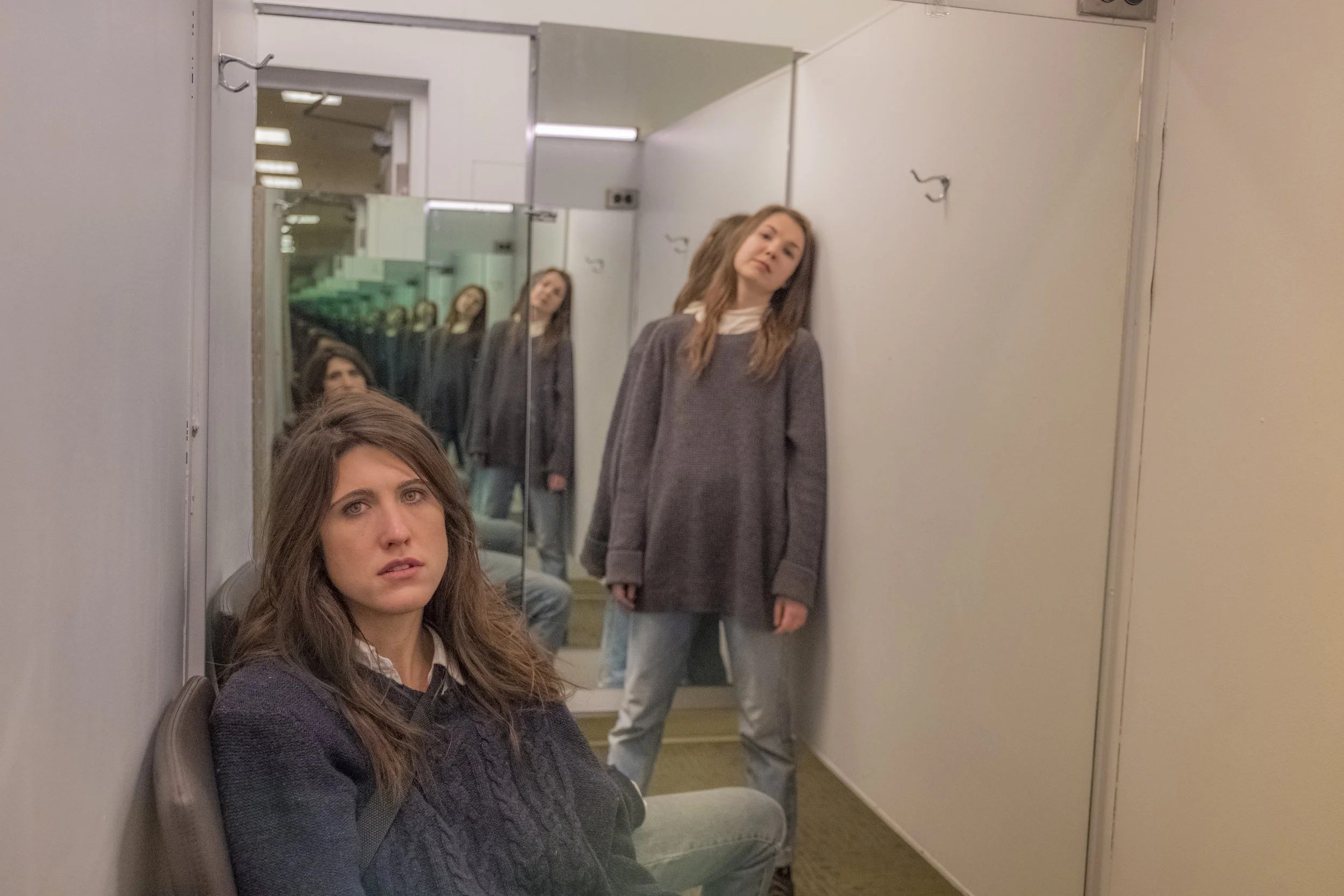Mouthpiece: Patricia Rozema's stage adaptation successfully divides the psyche into two bickering halves
By Liam Lacey
Rating: A
From its opening scenes, Mouthpiece, the adaptation of Amy Nostbakken and Norah Sadava's hit Canadian play is intriguingly baffling: Who exactly are these two identically-dressed long-haired women (portrayed by Nostbakken and Sadava themselves) sharing a bike, bed, and bath?
Are they friends, lovers, sisters? It takes a few beats to realize that, although they don't look alike (Nostbakken is comically taller) the two women represent conflicting parts within the same person.
That person is Cassandra, a thirtyish Toronto journalist who comes home from a bar and wakes up, hungover, to a series of family phone messages. Her middle-aged mother has died of a sudden stroke.
Amy Nostbakken and Norah Sadava are two halves of a conflicted woman’s personality in Mouthpiece
The subject may be glum but there is something consistently pleasurable about Mouthpiece, a film that is both audacious in execution and relatable, even for those of us who don't live in women's bodies. The story takes place over a couple of days as Cassandra makes funeral preparations, with flashbacks to past events.
These include Cassandra's childhood, when she witnesses her mother's frustration at giving up her writing career to raise children, and out of her own fears and self-worth issues, transfers similar feminine insecurities in her daughter.
As Cassandra bicycles around a wintry Toronto, shopping for food, flowers and a casket, while juggling calls with relatives, she argues with herself and attempts to compose a eulogy for her mother (which none of her relatives want her to do, given the mother and daughter's recent fractious relationship). As she goes about her errands, mentally composing the eulogy, the dueling Cassandras struggle to find the balance between love and honesty. ("She was a hard-ass." - "She was a doormat.")
The constant inner debate is likely to carry off the screen into the viewer's head. (Surely the conceit spoils the ‘naturalness’ of the story.– “You mean when one woman is having comfort sex with her ex-boyfriend and the other is sitting in a chair doing commentary? No, that’s just funny.”- Doesn't all this divided-self and internalized oppression stuff feel some kind of didactic feminist allegory? – “You mean when one woman thanks a construction worker for checking out her butt and the other part of her tells him to fuck off? Pretty much a case of scenes from everyday life.”)
With its anti-naturalistic approach to story-telling, Mouthpiece also raises questions about what it means to "open up" a stage play for the big screen. I never saw the stage-production of Mouthpiece, which premiered at Theatre Centre in 2015 as a 65-minute production. The play was already something of a cause celebre, winning a string of awards in Canada and at the Edinburgh Fringe Festival. Jodie Foster brought the play to Los Angeles for a private showing. The freshness of the concept, the choreography of the two performers, the resonance of the mother-daughter conflict have all been noted in those reviews.
Director Patricia Rozema (I've Heard the Mermaids Singing, Mansfield Park) has approached the material, not to take it as a radical jumping off point, but to create a self-effacing film in the service of the play. (An example that comes to mind is Jonathan Demme's Swimming to Cambodia). Occasionally, the original play's language has been dropped when images tell the story better. There are also more characters and scenes, handled by phone onstage. The film involves real-life actors, adding complexity to the blocking (like a ghost only some people can see), while creating ambiguity about what’s literal and imaginary. Does Cassandra actually climb into a coffin to test its size, leading the mortician to note "Grief manifests itself in unexpected ways.” Or is that the projection of her disassociated self, going through the grim process of bartering for a casket?
The camera circles around the two women, suggesting their inter-twined state. At times, one actress is in the foreground of the scene, but there's no clear demarcation between which actor has which characteristics.
Reflecting glass and mirrors amplify the double theme. But apart from some flashbacks and brief lulls, we are never allowed to forget the story-telling artifice for long. When the two Cassandras wrestle with each other on the way to the front of the church to do the eulogy, we're seeing an idea come to life, not an action scene.
One could quibble that the actual plot of Mouthpiece — the ever-popular indie film family funeral event -- is a bit familiar and the emotional pay-off modest compared to the build-up. But the daring concept, execution and humour make this something distinctly out of the ordinary.
Special mention should go to almost subliminal impact of Amy Nostbakken's original dreamy electronic score, the wordless female chanting, that suggests Cassandra struggle to find her voice.
Mouthpiece. Directed by Patricia Rozema. Written by Patricia Rozema, Norah Sadava and Amy Nostbakken, based on the play by Norah Sadava and Amy Nostbakken. Starring: Norah Sadava and Amy Nostbakken. Mouthpiece shows at the TIFF Bell Lightbox.

